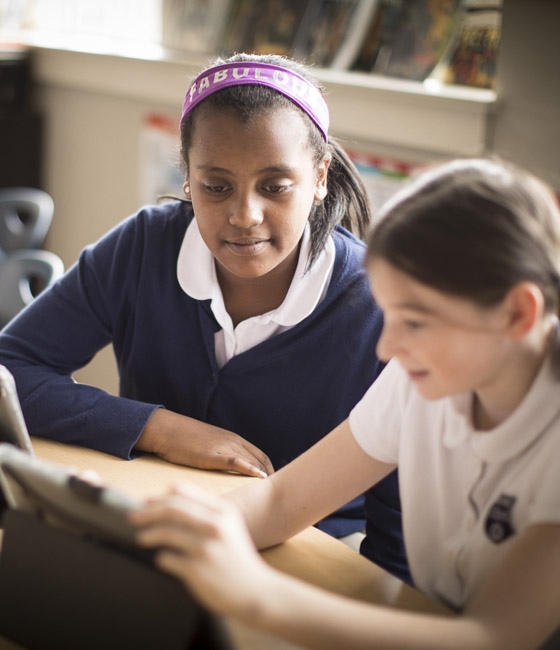
DEVELOPING IN CHARACTER, LEADERSHIP, AND INDEPENDENCE
Transitioning into Independence
Grades 3-6 are pivotal years. Park Street School’s Upper Elementary student experience combines new content with applied knowledge. We develop the art of questioning and hone research skills using authentic resources. We solve problems and express ourselves in new and innovative ways through technology, fine arts, scientific experiment, mathematical discovery, and explicit writing genres. In preparation for Middle School, students have additional class time in Science and subject areas including Drama, Technology, and Design Learning.
Experiences connect learning in the upper grades. Students make deeper connections and see real-life application in a variety of ways. They construct instruments to understand sound, including the frequencies and intensities of sound waves, in third grade; build sets and perform Shakespeare’s “A Midsummer Night’s Dream” in fifth grade; make their way out of a Math-themed escape room in fourth grade; and build water bottle rockets to launch at the Esplanade.

Science, Technology, Fine Arts & New Skills
What Makes Grades 3-6 Special
“Mini Middle School” — Grade 5-6
Grades 5 and 6 students engage in a “Mini Middle School” model that features teacher specialists for each subject, rotation of classes, homeroom clusters, daily recess, and meaningful integration of key themes and topics across disciplines. This model nurtures life skills such as organization, time management, and flexibility as well as collaboration and engaged interaction with teachers and peers.
Poised and Confident
Confidence is built over time and with opportunity. We start at a young age to engage students in public speaking. Opportunities abound to grow in poise and confidence. Fifth graders share pieces of poetry they’ve written with their peers at the “Poetry Cafe.” Boys and girls in Grade 4 perform monologues at the medieval banquet. Third graders winsomely enact Snow White and the Seven Dwarfs at the “Evening of the Arts” event for the whole Elementary School. Older students are paired with younger “reading buddies,” and grow in being a role model. And, our sixth graders emcee Chapel. By the time our sixth graders graduate, they are poised, confident, and resilient.
Growing a Love of Learning with Real-Life Application
The combination of our breadth of content with applied knowledge develops a love of learning in students. They learn the art of questioning, to hone their research skills based on authentic resources, to problem-solve, and express themselves creatively through technology, fine arts, scientific experiments, mathematical discovery, and explicit writing genres.
Holistic Nurturing of Character
The God-given gifts of each child are recognized and intentionally cultivated in our caring, yet challenging learning environment. We encourage students’ unique academic, spiritual, social-emotional, and physical development. This produces leaders of influence who exemplify character through responsible behavior, empathy, collaboration, and perseverance.